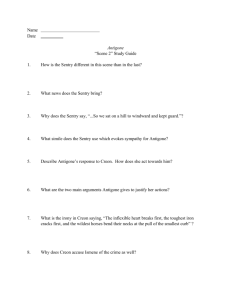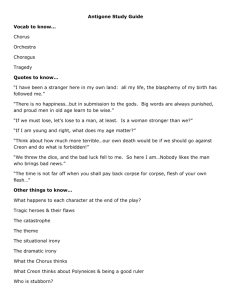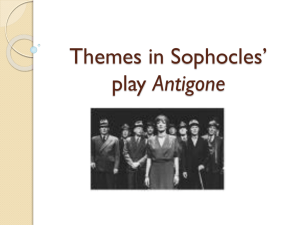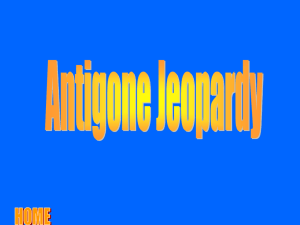Antigone – Reading/Discussion Questions
advertisement
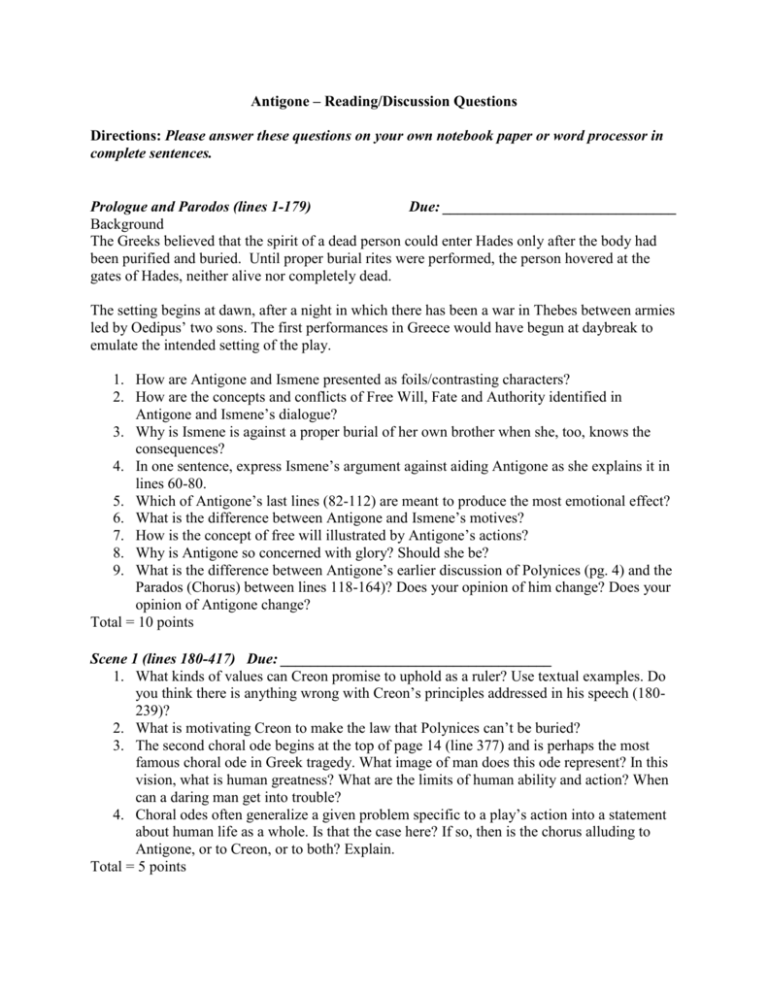
Antigone – Reading/Discussion Questions Directions: Please answer these questions on your own notebook paper or word processor in complete sentences. Prologue and Parodos (lines 1-179) Due: _______________________________ Background The Greeks believed that the spirit of a dead person could enter Hades only after the body had been purified and buried. Until proper burial rites were performed, the person hovered at the gates of Hades, neither alive nor completely dead. The setting begins at dawn, after a night in which there has been a war in Thebes between armies led by Oedipus’ two sons. The first performances in Greece would have begun at daybreak to emulate the intended setting of the play. 1. How are Antigone and Ismene presented as foils/contrasting characters? 2. How are the concepts and conflicts of Free Will, Fate and Authority identified in Antigone and Ismene’s dialogue? 3. Why is Ismene is against a proper burial of her own brother when she, too, knows the consequences? 4. In one sentence, express Ismene’s argument against aiding Antigone as she explains it in lines 60-80. 5. Which of Antigone’s last lines (82-112) are meant to produce the most emotional effect? 6. What is the difference between Antigone and Ismene’s motives? 7. How is the concept of free will illustrated by Antigone’s actions? 8. Why is Antigone so concerned with glory? Should she be? 9. What is the difference between Antigone’s earlier discussion of Polynices (pg. 4) and the Parados (Chorus) between lines 118-164)? Does your opinion of him change? Does your opinion of Antigone change? Total = 10 points Scene 1 (lines 180-417) Due: ____________________________________ 1. What kinds of values can Creon promise to uphold as a ruler? Use textual examples. Do you think there is anything wrong with Creon’s principles addressed in his speech (180239)? 2. What is motivating Creon to make the law that Polynices can’t be buried? 3. The second choral ode begins at the top of page 14 (line 377) and is perhaps the most famous choral ode in Greek tragedy. What image of man does this ode represent? In this vision, what is human greatness? What are the limits of human ability and action? When can a daring man get into trouble? 4. Choral odes often generalize a given problem specific to a play’s action into a statement about human life as a whole. Is that the case here? If so, then is the chorus alluding to Antigone, or to Creon, or to both? Explain. Total = 5 points Scene 2 (lines 418-700) Due: ____________________________________ 1. Write 2-3 sentences of commentary about why you think Antigone is compared to a mother bird in lines 471-473. Think about how Polynices’ corpse is “carrion for the birds and dogs to tear” (230-231) and the manner in which the sentry “closed on the kill like hunters” (481). 2. How does the ode at the end of the scene contrast with the previous ode. Is it similar or different? What meaning can you draw from it? Total = 5 points Scene 3, Ode 3 Due: __________________________________________ Background Although in Scene 1 Creon claims to represent the State, in Scene 3 he refuses to accept the idea that his subjects support Antigone…(“And the City proposes to teach me how to rule?”) Finally, he gives up all pretense of representation and declares, “The State is the king!” The question of tyrannical power and authority surfaces and its ultimate destructive nature comes into question. Athenian audiences despised tyrants because tyrants ruled Athens for about a hundred years before a democratic government was established in 508 BC. Begin to view the characters in terms of a tragic character. A tragic character experiences a reversal of fortune as a result of fate or a flaw in his or her character. The tragic flaw is a fatal weakness in the character that causes this person to become enmeshed in events that lead to his or her downfall. This play has two tragic characters: Antigone and Creon. 1. What is ironic about Creon’s advice regarding Antigone? 2. What would you say Creon fears the most? 3. What character flaw is revealed by Creon? 4. What are Creon’s motives? How are his flaws revealed? 5. What is Haimon’s main argument? 6. What is Haimon’s tone? 7. Why does the Choragos refuse to take sides? 8. How is Haimon’s opinion like Antigone’s? What did she say that was similar? 9. Is Haimon fighting for free will by challenging authority? Explain. 10. How has Haimon’s attitude changed from the beginning of the scene to the end? 11. What is the price of ultimate authority? 12. Ode 3 is a bitter commentary of love. Write a paragraph with embedded CDs on the view of love presented in Ode 3. Why does the Chorus give only one view of love? 13. Suggest some of the strengths of love by writing a poem. Total = 20 points Scene 4, Ode 4 Due: __________________________________ (lines 895-1089) Background Antigone holds to the classical Greek view of the afterlife: Although it is a place where there are “no more tears” and where there may be some reunion with those who have gone before, it is also a place without warmth and music, a place of darkness and a place of thin ghosts. Indeed, a part of Antigone’s heroism lies in her willingness to consign herself to a place of such mixed happiness and gloom. 1. In Antigone’s first lines, is she showing regret? What is the tone and mood of the scene? 2. What fate does Antigone compare to her own? 3. What does Antigone say is the cause of her death? 4. What does Antigone look forward to in death? 5. What curse does she put on Creon? 6. Do you think the family curse deserves to be mentioned in this scene? 7. Creon says his hands are clean, does he believe this or is he posturing? 8. How does Antigone’s reference to Niobe reflect her own suffering? 9. What flaw in Antigone’s character does the chorus reveal? 10. What is the relationship between fate and free will? 11. What is the subject of Ode 4? Why does the Chorus explain Danae’s story at this point? What is the connection to Antigone and her situation? Scene 5, Paean, and Exodos Due: ________________________________ Background What was new in the plays of Sophocles was their greater emphasis on the development of individual character…His characters are no longer simply the playthings of the gods. They act in accord with definite ideas of their own…all of Sophocles’ protagonists display unshakable will power….”(Robert Flaceliere, Literary History of Greece). Flaceliere suggests that Antigone, rather than Creon, is the play’s best example of inflexible will power. Do you think Sophocles believes “inflexible will power” to be a tragic flaw or a virtue? Notice the repetition of a burial in the Exodos. Burials are representative of familial and religious loyalty. This is the extended metaphor of Antigone. By the end of the play, Creon will seek his own burial. 1. What is Teiresias predicting? 2. At what point in Scene 5 does Creon change his tone and attitude? When does he give in? Why? 3. Why does Creon decide to save Antigone? What are his motivations? 4. What is Creon’s state of mind? 5. What does Teiresias accuse Creon of? 6. Why does Creon suspect Teiresias of being corrupt? Is Creon losing control? What is he afraid of? 7. What does the messenger’s words imply happened? 8. What is worse, living with the pain, or death?


